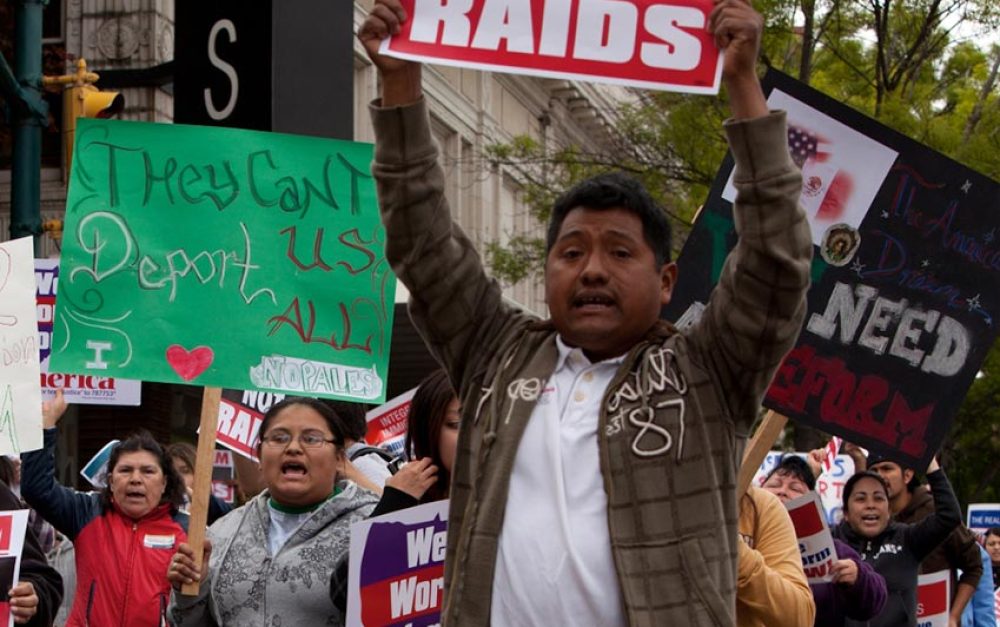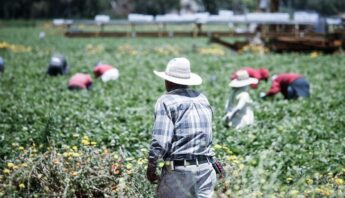Along with partners across the country, PAN is strongly opposing the recent raids and deportations of immigrant families from Central America. As you may have heard, these Department of Homeland Security (DHS) raids are taking place in communities across Texas, Georgia and North Carolina. And they represent the antithesis of the immigration reform we so urgently need.
The raids also directly undermine our collective efforts to build a socially just, healthy and sustainable food system. For decades, our industrialized, pesticide-dependent food system has been propped up by policies ensuring unfettered access to the labor of exploited, demoralized and fearful immigrants. This is immoral, and needs to change.
Real-world impacts of “free trade”
Sadly, policies supporting exploitation and disregard for immigrants’ wellbeing are par for the course here in the U.S. In 1994, for example, there were 4.5 million Mexican-born immigrants in the country. By 2008 that population had tripled — a direct result of trade policies such as the North American Free Trade Agreement (NAFTA) signed by then-President Clinton, setting in motion a devastating fall in the prices of staple crops like corn and coffee that forced small farmers across Mexico into bankruptcy.
These family farms were subsequently replaced by large-scale agribusiness operations, and those who had owned them were driven across the U.S. border in search of job opportunities no longer available at home.
In the recent Food Chains film photojournalist David Bacon describes the extent to which economies around the globe (and U.S. agriculture in particular) are dependent on an easily exploitable immigrant labor force. Our opposition to the recent heartless deportation raids goes hand-in-hand with our opposition to NAFTA, the TPP and other trade policies that serve the interests of large transnational corporations — including agribusinesses like Monsanto and Dow — at the expense of working families in all countries.
U.S. communities respond
Churches and immigration rights groups throughout the U.S., such as the Fair Immigration Reform Movement (FIRM), are stepping up to help those targeted for deportation by DHS. It turns out that many people with orders of removal may have legal options, as the orders are often improperly issued without due process. Mislabeled notices, coercion and inadequate access to legal representation are some of the main reasons the deportation orders can be cancelled.
The #Not1More campaign is building diverse alliances to expose, confront and overcome unjust immigration laws, and provide tools to those individuals directly affected. This includes a list (in Spanish) of ten steps one should take to prepare for a DHS raid. The governments of Guatemala and El Salvador have advised their citizens in the U.S. that they need not open their doors to immigration agents unless the officers have a warrant signed by a judge. They also recommend that everyone carry phone numbers of family members, a lawyer and the nearest consulate with them at all times.
We ask our partners and supporters to join us in calling for an end to the DHS raids. Those being targeted are not criminals, nor are they on a list of national security threats. These are individuals forced to leave their homes in Central America and elsewhere for fear of terror or destitution. They include the more than 100,000 immigrants who came in 2014, many as unaccompanied minors fleeing rampant gang violence and poverty in Honduras, El Salvador and Guatemala.
The fact is, the just and healthy food system we’re all working toward cannot be built on the backs of exploited immigrants. Pressing for real immigration reform must be part of the work we take on, together.








